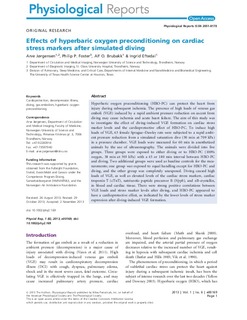Effects of hyperbaric oxygen preconditioning on cardiac stress markers after simulated diving.
Abstract
Hyperbaric oxygen preconditioning (HBO-PC) can protect the heart from injury during subsequent ischemia. The presence of high loads of venous gas emboli (VGE) induced by a rapid ambient pressure reduction on ascent from diving may cause ischemia and acute heart failure. The aim of this study was to investigate the effect of diving-induced VGE formation on cardiac stress marker levels and the cardioprotective effect of HBO-PC. To induce high loads of VGE, 63 female Sprague-Dawley rats were subjected to a rapid ambient pressure reduction from a simulated saturation dive (50 min at 709 kPa) in a pressure chamber. VGE loads were measured for 60 min in anesthetized animals by the use of ultrasonography. The animals were divided into five groups. Three groups were exposed to either diving or to HBO-PC (100% oxygen, 38 min at 303 kPa) with a 45 or 180 min interval between HBO-PC and diving. Two additional groups were used as baseline controls for the measurements; one group was exposed to equal handling except for HBO-PC and diving, and the other group was completely unexposed. Diving caused high loads of VGE, as well as elevated levels of the cardiac stress markers, cardiac troponin T (cTnT), natriuretic peptide precursor B (Nppb), and αB-crystallin, in blood and cardiac tissue. There were strong positive correlations between VGE loads and stress marker levels after diving, and HBO-PC appeared to have a cardioprotective effect, as indicated by the lower levels of stress marker expression after diving-induced VGE formation.
KEYWORDS:
Cardioprotection, decompression illness, diving, gas embolism, hyperbaric oxygen preconditioning
